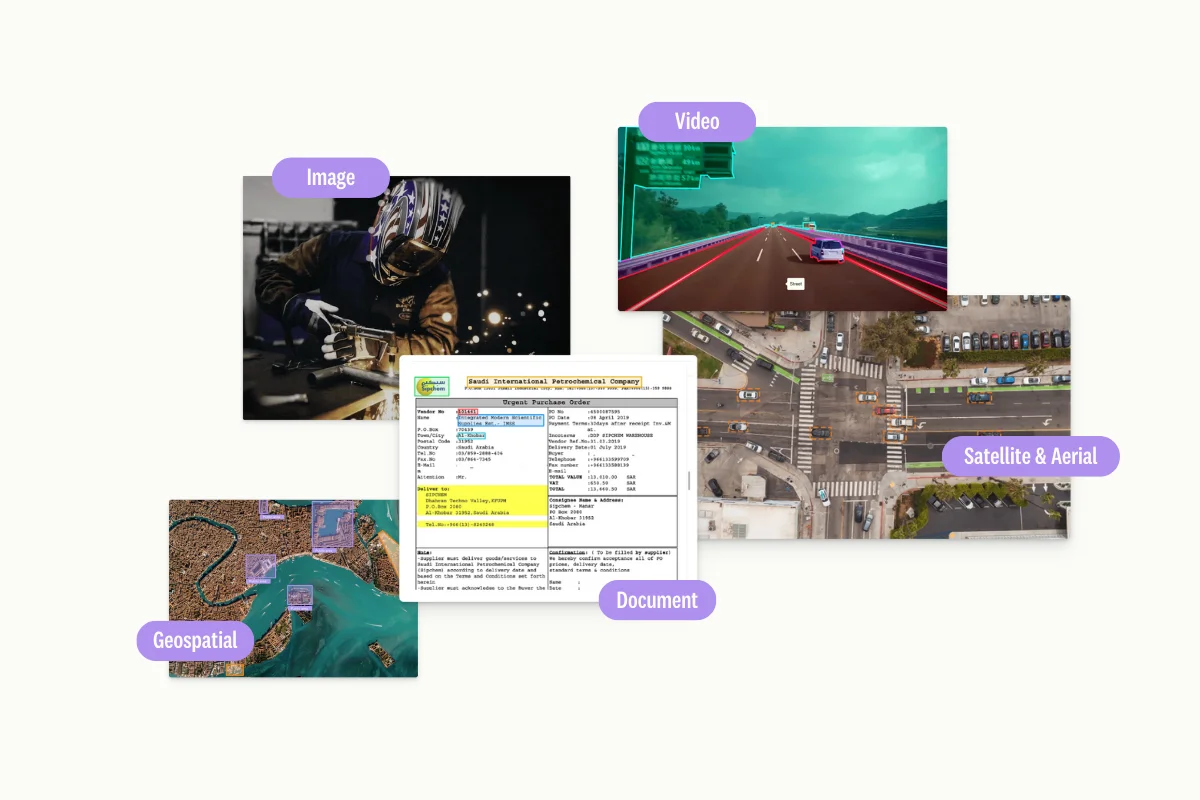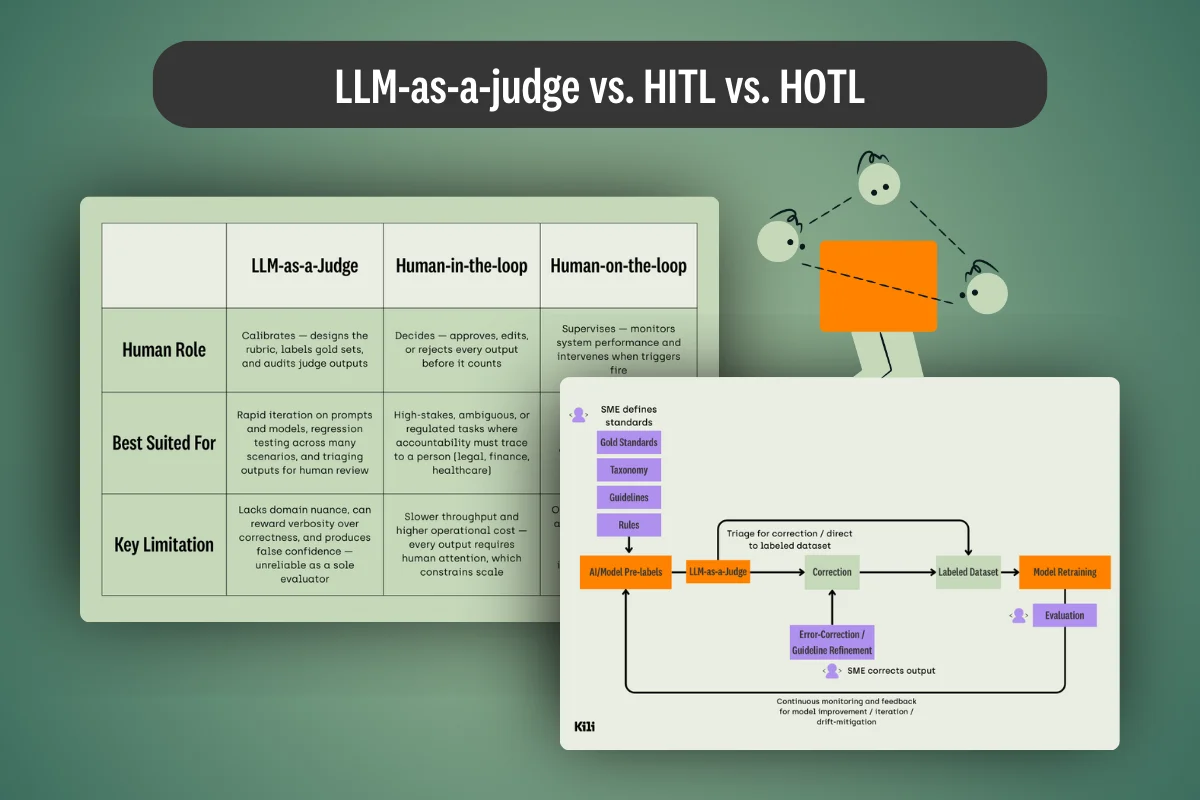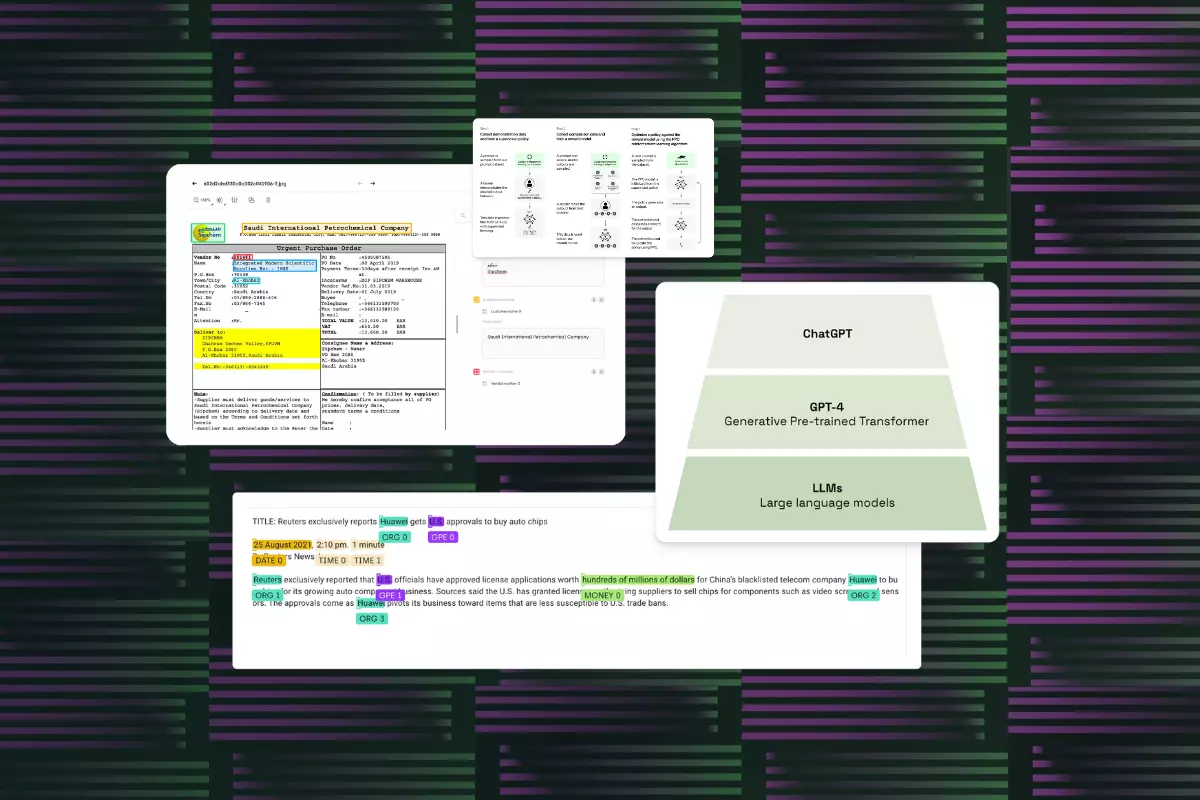Self-supervised learning allows AI companies to train deep learning models without human intervention. Yet, these models must be fine-tuned, with annotated data, before they are useful for specific use cases. ChatGPT, for example, uses a method called reinforced learning with human feedback, allowing the chatbot to understand human instruction and display safe behavior.
Data labeling remains relevant as deep learning models evolve. It involves collaboration among ML engineers, data scientists, domain experts, human labelers, and reviewers to clean, tag and categorize unstructured data. This is the foundation for creating better-performing models. Often, companies outsource the process to third-party data labeling service providers.
In this article, we’ll explore data labeling services prices and compare the rate offered by different providers. We’ll also discuss price expectations when outsourcing data labeling for different data types.
Why machine learning teams need data labeling services
Training deep learning models is a painstaking process that often overwhelms companies embarking on AI development. Machine learning teams are tasked to identify, train and deploy AI models, which they later integrate with business workflows.
Often, ML teams engage external providers to address their data labeling needs. Here’s why.
Enormous data quantity
Deep learning models have grown in complexity to meet market demands for smarter, faster, and more human-like AI capabilities. Likewise, the amount of data and diversity needed to train such models increases beyond in-house capabilities. Rather than establishing large data labeling teams, it makes better sense, financially and operationally, for ML teams to outsource the process. This allows the team to focus on other aspects of AI development, such as refining the machine learning algorithms.
Complex annotation type
Manual data labeling might still be practical in some cases. However, if you need sophisticated machine-learning capabilities, such as object detection, image classification, named entity recognition, or more granular categorization, the data labeling task can then become very fastidious. This involves a tightly-organized labeling workflow, which many teams are unprepared to set up internally. Rather, they seek a professional labeling workforce from providers like Kili Technology.
Limited labeling capacity
Even if you have an in-house labeling team, you will benefit from an external provider when projects are piling up. A rush job seldom produces the quality needed to train a high-performing machine learning model. Rather, you can outsource some of the tasks at reasonable labeling costs to balance productivity and quality. More importantly, you won’t miss crucial deadlines for your AI projects.

What’s the benchmark for data labeling services price?
When training or fine-tuning machine learning models, every piece of annotated data adds up to the total cost of your AI project. So, this begs the question – what is a fair price to pay?
Now, there is no quick answer because data labeling is subject to several factors influencing the service fee. You’ll pay more if you’re engaging a service provider for complex labeling tasks. For example, performing multiple instance segmentation of small objects will likely cost more than a simple classification task because of the workflow and tools involved.
Quantity is also a factor in determining how much service providers charge for annotation tasks. Logically, the more annotation units generated, the higher the fee is, even if the service provider offers bulk discounts. Also, labeling with specific requirements is more expensive. For example, annotating data for medical imaging tasks require input from medical professionals, which raises the total cost. Also, pricing is dependent on the service provider. For example, some might structure the price unit according to the data item or entities identified in video frames, while others bill for the time taken to do so.
While we can’t provide a standard benchmark, we can give you a broad idea to manage price expectations when engaging a data labeling provider.
Image classification
An image classification task involves classifying or labeling the entire image into a specific category. For example, the annotator is presented with an image containing dogs and tags it with ‘image with animals’. While the process is straightforward, factors like the number of classes and quantity affect the pricing.
Price: $0.01 to $0.10 per image.
You can check out the list of some of the best image annotation and labeling service providers in 2023
Object detection
Object detection starts with an image bounding box task before annotating the bounded object. Here, the annotators apply a bounding box on one or several objects the model needs to be trained on. Then, they tag the bounding boxes with the appropriate class.
Price: $0.036 to $1.00 per bounding box.
Explore the lineup of top video annotation and labeling service providers in 2023.
Semantic segmentation
Semantic segmentation is a resource-intense labeling task that involves annotating an image at the pixel level. For example, the annotator tags pixels in a street view photo with ‘cars, pedestrian, lamp post, road, and road signs’. Because of the expertise and detailed approach, semantic segmentation might be costly, particularly if it has a high degree of complexity.
Price: $0.10 to $1.00 per mask.
Text classification
Text annotation is used to support natural language processing capabilities. Annotators perform text classification task, which involve extracting, identifying, associating, and labeling words, phrases, or sentences. Depending on the annotation units and complexity, the cost might vary.
Price; $0.001 to $0.13 per unit of text.
Feel free to explore our compilation of leading text annotation and labeling service providers in 2023.
Named entity recognition
Named Entity Recognition (NER) is a sub-task of information extraction that identifies and classifies named entities in text. Named entities are real-world objects such as persons, locations, organizations, and date expressions that can be denoted with a proper name. NER is already a complex task and if the text contains many different types of entities or entities that are difficult to recognize, the cost can increase.
Price; $0.024 to $0.70 per unit of text.
Take a look at the compilation of top document annotation and labeling service providers in the year 2023.
Audio annotation
In audio annotation, labelers transcribe and tag speeches, voices, and sounds to train the model to recognize the spoken words, emotions, and speakers. Often, this involves listening to audio sources, which is time-consuming and may result in costlier annotation fees.
Price: $0.10 to $10.00 per minute of audio.
audio here
8 Data labeling services compared
Understandably, data labeling services and prices differ amongst providers. They will offer different terms that dictate how much you’ll pay for the labeled data.
We list the best data labeling services that ML teams and organizations trust below.
Watch video
1. Kili Technology
Kili Technology provides a professional data labeling workforce that uses our powerful data labeling platform. Our labeling workforce is trained to produce high-quality datasets for diverse ML use cases. Throughout the years, our labelers have helped companies like IBM, Michelin, and AirBus with their data annotation needs.
Besides connecting your team with industry experts, Kili Technology ensures data protection with appropriate security measures. We also ensure that our labelers represent diverse demographics, ensuring bias-free training samples.
We charge between $6 to $60 per hour, or you can request a custom quote.
2. Scale Rapid
Scale Rapid provides data labeling services for image, video, text, and documentation data types to support your AI development. The service, called Workforce Labelling, frees you from setting up a dedicated labeling team in your organization. Instead, you hire a workforce trained with the Scale labeling software to provide consistent, quality datasets.
Scale charges between $0.02 to $0.13 per annotation unit.
3. Labelbox
Labelbox works with professional labelers from various industries to help companies accelerate their AI developments. Labelbox promises an on-demand data labeling service with an impressive turnaround time without compromising quality. The entire engagement takes place on the app, where you can monitor and review the labeler’s deliverables.
Labelbox doesn’t disclose its service fees but offers a free trial.
4. V7 Labs
V7 Labs boasts more than 5,000 trained annotators that their users can outsource. They allow you to request human labeling a project basis or long-term engagement. Either way, you’ll have access to labelers experienced in various domains, including radiology, electrical, and pathology. More importantly, they are trained to use the labeling app to generate quality training samples quickly.
V7 Labs provides a custom quote for each labeling project.
5. Clarifai AI
Clarifai AI offers reliable workforce for text, image, and video annotation. They help companies train and build deep learning models by partnering with professional labelers in the US and other regions. Clarifai AI also offers robust security features, such as running background checks on labelers before initiating the workflow.
Clarifai AI offers labeling services starting from $0.05 per annotation for the first 500,000 annotations.
6. AWS SageMaker Ground Truth
AWS SageMaker Ground Truth is a data labeling service offered by AWS to its users. It allows you to assign labeling tasks to Amazon Mechanical Turk workers or work with your appointed labeling provider. The platform will guide the workers through labeling, ensuring consistency for all objects identified.
AWS SageMaker Ground Truth with Mechanical Turk has a pricing calculator you can use to estimate the costs.
7. Supervisely
Supervisely specializes in data labeling outsourcing for training computer vision models. Led by data professionals, their team uses your chosen data labeling tools to perform the video object tracking task, categorization, entity extraction, and other image annotation tasks. Supervisely’s service package includes a free test and transparent pricing to ensure the annotation datasets meet your needs and budget.
Supervisely provides a personalized quote for a would-be client.
8. Superannotate
Supperannotate provides annotation services for diverse industry use cases, including healthcare, security, sports, and robotics. Their annotation workforce is trained to create high-quality datasets with bounding boxes, landmark annotation, 3D point, landmark, and other annotation techniques. Supporting up to 18 languages, Superannotate allows companies to generate consistent training data across different geographic regions.
Supperannotate lets clients test their service with a free pilot.
What does the price include?
Before you sign up with any data labeling service provider, it’s important to clarify what the service fee covers. Labeling providers might base their pricing on different criteria, such as people labor per hour, annotation units, or annotated samples. Beyond that, there are other criteria that justify the amount you’re paying for.
For example, most service providers include these in their fees.
- The fees paid to every human labeler and tools used in the annotation tasks.
- Appointing a project manager to oversee task distribution, issue resolution, and ongoing communication.
- Quality checks to ensure the training data comply with your requirements and pre-defined metrics.
- Implementing data security features, such as using encrypted storage and role-based access, to safeguard data privacy.
- Additional operational support that you need throughout the project duration.
Still, the quoted fee might only cover some of the necessary tasks in preparing quality datasets to train deep learning models. Usually, labeling providers don’t include these services in their initial pricing plan unless requested.
- Data collection. Often, you’re required to provide the raw data to the human labelers.
- Data preprocessing. Labeling providers expect to receive ready-to-annotate data from clients. They may charge if the data requires additional formatting.
- Project setup. Some providers may waive the project setup fees, but others will add to the standard rate.
- Customization, whether using a specific tool or data labeling workflow, may add to the charges.
- Lastly, the labeling provider may not undertake post-labeling analyses. They assume that clients will assess the annotated datasets for correctness and consistency. If you need such a service, you’ll have to pay extra.
The cheaper, the better?
Not exactly. Training a deep learning model is potentially expensive, and data labeling further contributes to the cost. Yet, skimming on data labeling tasks, or choosing a provider solely on price, is not the wisest option.
Instead, consider the quality, data security, expertise, support, and capacity the data labeling provider has to offer. For example, if you’re training a computer vision model, you’ll need a provider with labelers trained in segmentation, cuboid, and other image annotation or video classification task. Even if they do, their ability to enroll the number of labelers to meet the stipulated deadlines is also a point of consideration.
Let’s also be mindful of data security concerns, particularly when AI companies are under immense pressure to safeguard public interests.
- Is the provider using labeling tools built with security features?
- Do you have controls over which information is revealed or hidden from the labelers?
These questions clarify whether the provider can help your team comply with stringent regulations like OC2, HIPAA, and ISO27001.
And now, what?
So, don’t choose a data labeling service provider for price alone. Instead, engage a provider that has consistently delivered for their client. Make sure that they offer services that meet your labeling needs. More importantly, check out client testimonials on independent sites to learn if the providers were true to their words.
We know that canvassing scores of data labeling providers to find the best match can be daunting. Here’s a list of 250+ labeling service providers to help you get started. Alternatively, talk to our team to access our growing network of trusted and trained professional labeling workforce.
FAQ on Data Labeling Services
Why is data labeling important?
Data labeling produces training samples that allow engineers to train and develop accurate machine learning models. Annotated data serves as the ground truth the model uses to respond to real-world data.
What types of data can be labeled?
Most data labeling providers support text, image, audio, and video data types. However, it's best to consult the service provider if you need to label LIDAR, satellite imagery, and other unique datasets.
How long does it take to label a dataset?
Several factors may affect the dataset labeling process, including complexity, tools, volume, labeler competency, and the provider’s capacity. Your provider shall furnish you with an estimated timeline when you create a data labeling request.
How much do data labeling services cost?
Various factors affect data labeling service pricing, including data types, project complexity, quantity, labeling infrastructure, and the provider’s pricing strategy.
Why is data security important in data labeling?
Companies and stakeholders are concerned about potential data breaches and leaks when preparing training samples. Therefore, providers like Kili Technology use stringent security measures like secure storage and multi-factor authentication to prevent data risks.
Watch video

.png)

_logo%201.svg)


.webp)

